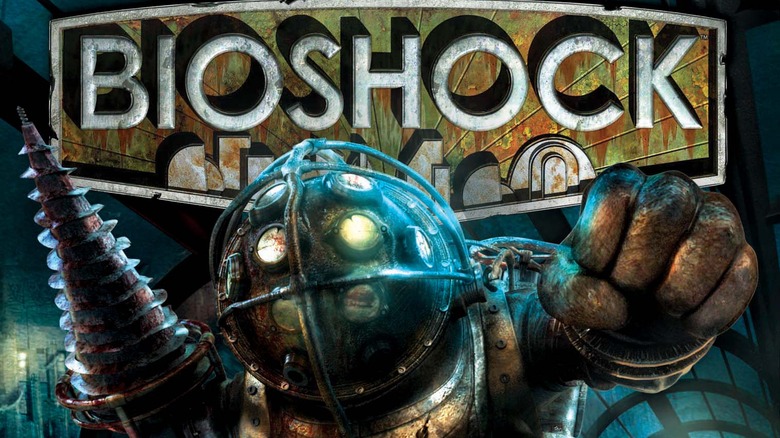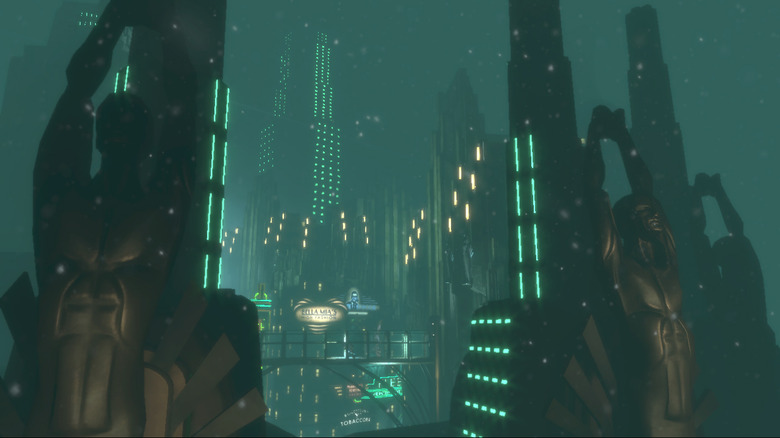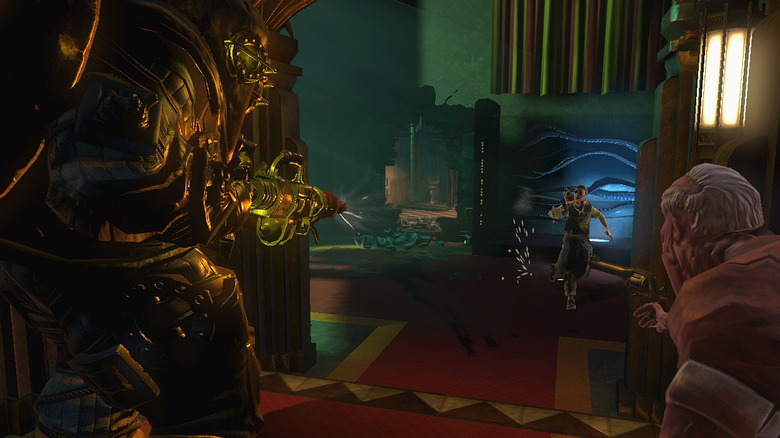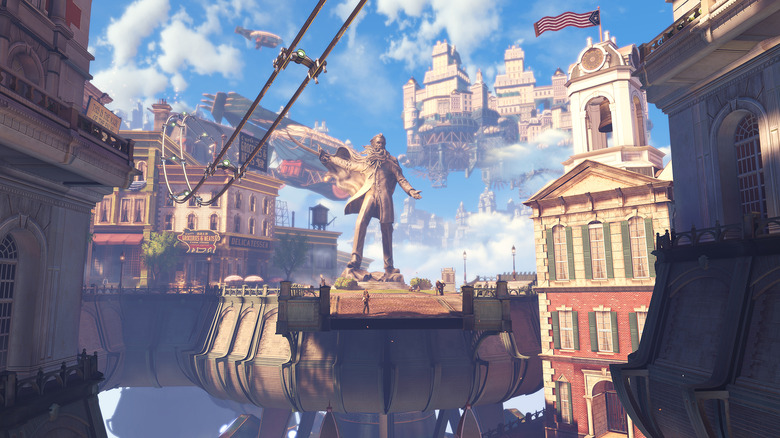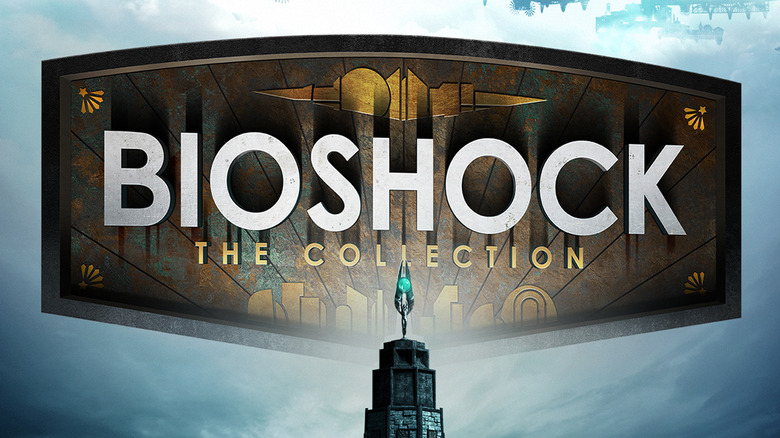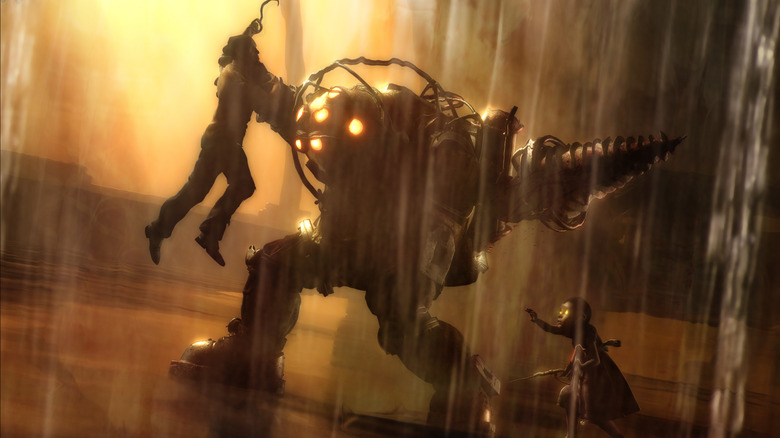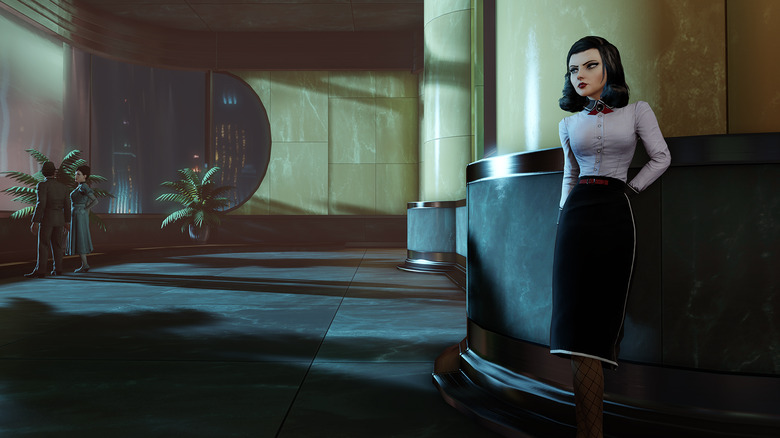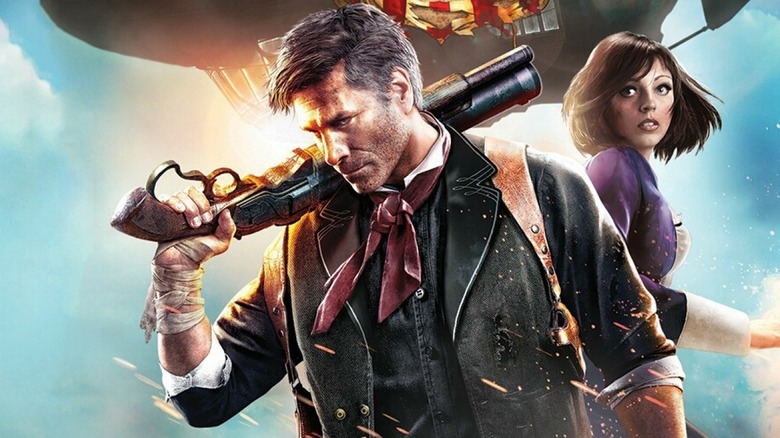Why BioShock 4 May Never Happen
Barely a year after the release of BioShock Infinite, the critically-acclaimed third installment in the BioShock franchise, creator Ken Levine shockingly shut down Irrational Games, the studio responsible for the two most popular games in the series. During his announcement, Levine made it clear that BioShock was now the intellectual property of 2K Games, which stated later that year that it would continue the franchise if the studio could find a creative way to realize the series' full potential.
That was back in 2014. Since then, there has been radio silence on the development of a new BioShock front outside of speculation in the fall of 2017 that 2K Games was hiring for a new first-person shooter, which might be BioShock 4 (emphasis on might). Granted, 2K could really be ready to start building the next BioShock and take a crack at delivering a worthy addition to the revered franchise. However, a look back at the series' history paints a pretty grim picture for BioShock 4's chances. While we'd love to see what insane objects fly out of our hands in an all-new BioShock experience, the odds are pretty high that zipping around the skies of Columbia was our last romp through Ken Levine's politically-charged sci-fi world.
BioShock went through a nightmare development process
When BioShock dropped in August 2007, players were blown away by the underwater city of Rapture and the creepy, Ayn Rand-inspired nightmares that dwelled within. The game also blended unique first-person shooter mechanics with RPG elements that earned BioShock numerous accolades. But getting the underwater dystopia to shelves was a grueling experience for Irrational Games.
In a look back at BioShock's development, Eurogamer reports that the game was originally set in space and had players fighting alien eels. Fortunately, BioShock creator Ken Levine adjusted course, but that process was anything but smooth. According to developers, Irrational was a tiny company that was forced to hire inexperienced rookies. On top of that, Levine had a reputation for profanity-laced outbursts and was extremely adversarial about his creative vision for the game. He also instituted seven-day work weeks, which took its toll on his battered team. If that wasn't bad enough, a few months before release, a disastrous focus group left players so confused that one tester didn't even realize the game was set underwater. Levine was essentially sitting on a $25 million game that nobody understood. Not good.
Obviously, things worked out in the end, but it required a lot of frantic, last-minute tweaking to bring Levine's vision to life. In a way, the conditions had to be just right for Irrational to catch lightning in a bottle. That's not an easy thing for 2K Games to replicate if it wants to make BioShock 4.
BioShock 2 sales weren't the best
Following the success of BioShock, a sequel was ordered by 2K Games, and the turnaround time was remarkably quick. That's because Levine wasn't running the show, and the game was developed by 2K Marin instead of Irrational this time around. (Although a few members of the original BioShock team were involved, specifically Jordan Thomas, who oversaw the sequel's development.) It also didn't hurt that the game returned to the underwater city of Rapture, which freed the development team from building an entire new world from scratch.
Less than three years after the first game's release, BioShock 2 hit shelves in March 2010, and its initial sales looked promising. However, one of the major criticisms is that the game was too similar to its predecessor, but in later years, critics have revisited BioShock 2 and grown to appreciate its unique own charm. Vice even went so far as to call it the "best BioShock."
But while cultural appreciation is good, sales are even better. And if we're being frank, the numbers are what really counts when it comes time for a studio to decide whether to pull the trigger on a game's development, and what happened with BioShock 2 doesn't look good for BioShock 4's chances. According to Engadget, BioShock 2's sales slowed down way too soon and overall sales ended up being "lower than expected." That should give 2K Games considerable pause about diving back into the BioShock world without Levine.
BioShock Infinite was no picnic to make either
Levine's absence from BioShock 2 wasn't because he was tired of the series. In fact, it was just the opposite. Thanks to the success of the first BioShock, Irrational now had the time and creative freedom to make something "even more spectacular, memorable, and important," according to Polygon. That something was BioShock Infinite. While the game's development wasn't announced until 2009, Levine and Irrational had already started tinkering with Infinite on the heels of the original BioShock's launch. The development was clearly going to become another passion project for Levine, which also meant his grueling creative demands and intense personality were along for the ride.
As Polygon reports, the making of BioShock Infinite became another test of endurance for Irrational, and Levine's vision was getting so large in scope that large swaths of the game were being scrapped at whim. It was a frustrating process that eventually required outside help to be brought in, namely BioShock 2 director Jordan Thomas. But even that wasn't enough, and like the first BioShock, Infinite was in rough shape for release. Less than six months before launch, Levine hired Gears of War veteran Ron Fergusson to help ship Infinite, which never would have happened otherwise.
It goes to show that even with the creative force behind BioShock at the helm, these games are a beast to make if you want them to be successful, which Infinite ended up being. But it wasn't cheap to get there.
The budget for BioShock Infinite was out of control
While BioShock Infinite ended up being the highest-selling installment in the series, we know that the development process to get there was a minefield of problems. As the game approached its February 2013 release date, Kotaku reported that Levine was forced to cut a multiplayer mode that his team had poured considerable resources into building. It's no secret that multiplayer games are huge moneymakers and can stretch lifetime sales. Yet Levine couldn't make it happen with BioShock Infinite even with a supposed $100 million budget.
On top of that, Irrational and 2K Games parent company Take-Two Interactive is rumored to have dropped another $100 million just on marketing, according to Digital Trends. For the record, Levine has disputed on Twitter that his game cost $200 million, and Digital Trends questions that amount as well, but for reasons that don't look good for the future of BioShock. The delays on BioShock Infinite and Grand Theft Auto V caused "significant losses" to Take-Two, so the odds of the company having $200 million in capital didn't look good. But there's no denying that the cost to develop BioShock Infinite was on the high-end of the spectrum, and that could definitely weigh against reviving the franchise.
Irrational Games shut down
On February 18, 2014, Levine made the shocking decision to shut down Irrational Games. We're talking longtime employees had no idea what was happening until Levine announced it in a surprise meeting, according to Polygon. And they had every reason to be caught off guard. After the success of BioShock Infinite, which hadn't even been out for a year when Levine pulled the plug, the studio had "pedigree, talent and — to the outside world — creative carte blanche from its parent companies."
However, things weren't quite what they seemed. Polygon reported that sources within the company said that Irrational buckled under the intense pressure of grafting Levine's "unfettered creative freedom" with the expectations of "big-budget game development." Levine himself admitted in a 2016 interview with Rolling Stone that he wasn't suited to run a large game studio, and he blames himself for irreparable "schisms" that were formed between the developments of BioShock and BioShock Infinite.
With Irrational scattered to the wind, and Levine focused on his new baby, a "narrative Lego" game that he hopes will surpass his previous masterpiece, 2K Games would have to forge a new team that could stand the rigors of developing a BioShock game that would be both a critical and financial success, but wouldn't leave the company in shambles. As history shows, that's way easier said than done.
BioShock Vita never got a chance to live
In all of the excitement surrounding the release of BioShock Infinite followed by the surprise shuttering of Irrational Games not even a year later, an interesting nugget of news got lost in the mix. A rumored BioShock game for the Playstation Vita suffered a slow, quiet death. According to Engadget, Levine got talkative on Twitter a few months after closing down Irrational and confirmed details about the canceled game. Sadly, those details sounded awesome.
"I was thinking a Final Fantasy Tactics style thing set in pre-fall Rapture," Levine tweeted. "Something that would work well on the Vita and not be a compromise in any way. Also, as some know, I'm a turn based whore."
We don't know about you, but we'd inject a BioShock Tactics game directly into our veins. The combination sounds like a win-win, but as Levine revealed, the powers-that-be took a pass.
"2K and Sony couldn't put a deal together when I last checked. They seemed way more optimistic about this back in 2011," he tweeted. "Wish I could do it myself, but lawyers and that. I still love my Vita."
Only 2K Games knows why it couldn't make a new BioShock game happen in the lead-up to the heavily-hyped BioShock Infinite. Granted, the issue could've been brokering a deal with Sony, but it is notable that during BioShock's heyday, two studios were squeamish about launching a new title in the series. That doesn't bode well for BioShock 4.
BioShock Infinite neatly wrapped up the franchise
While we've covered the pitfalls of just trying to make a BioShock game, there's also a major narrative issue to tackle if 2K Games is serious about developing BioShock 4. As Forbes notes, the ending to BioShock Infinite contained a huge, overlooked twist that went way beyond the events of the game. If writer Paul Tassi is correct, and the evidence is in his favor, then BioShock and BioShock Infinite are directly connected through the game's reality-tearing physics. And it all goes down when the main characters find themselves in the underwater city of Rapture.
"Rapture, and really all the events of the original BioShock are direct, alternate parallels of everything that happens in BioShock Infinite, right down to the characters themselves," Tassi writes. "The proof that can't be overlooked? In the original BioShock, it's made expressly clear that only Andrew Ryan himself can operate the Bathyspheres in the city once they're on lockdown. ... In Infinite, you're operating them once again."
Basically, Bioshock's Andrew Ryan and Infinite's Zachary Comstock are the same person, which is whoa if true. While Levine has never confirmed this theory, it certainly seems like he enclosed the series in a beautiful loop. A new BioShock would have to fit seamlessly into that loop or somehow find a way to match the rich narrative that Levine crafted through time and space. Easy peasy, right?
Single player games might be a thing of the past
In October 2017, Electronic Arts sent shockwaves through the gaming community when it announced that it was shutting down Visceral Games, which was in the middle of developing a Star Wars game that would have been a "story-based, linear adventure game." In other words, a single-player game. The game's cancellation raised concerns across gaming sites that multiplayer games like Destiny were more profitable to studios, and therefore single-player games are in trouble.
"AAA non-service/single player games can succeed, but they really need to be the best in the genre and executed perfectly," analyst Daniel Ahmad tweeted while citing The Witcher 3 as an example. Basically, if you're going to go make a single-player it better be a stellar piece of gaming like The Legend of Zelda: Breath of the Wild or Horizon: Zero Dawn. That's a pretty high hurdle for BioShock 4 to clear, which 2K Games would have to pull off. The entire BioShock series is built on a compelling single-player experience, and fans of the series will expect nothing less in a new installment. Granted, BioShock 2 had a multiplayer mode, but it was also the worst-performing game in the series. BioShock 4 has to be a premium, AAA single-player game, so we wouldn't blame 2K Games if the risks outweigh the rewards.
There was a time and place for BioShock to shine, and that time just might be over.

